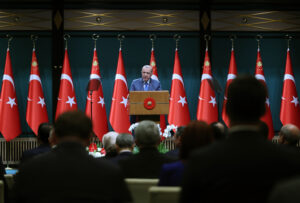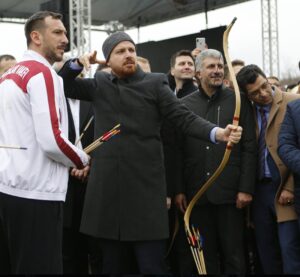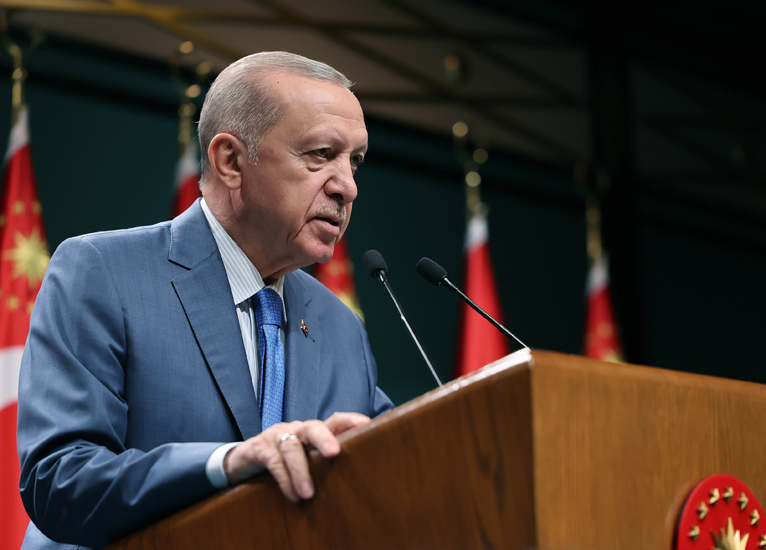Abdullah Bozkurt/Stockholm
The Turkish president recently revealed his true intentions towards Russia by paying tribute to the legacy of a notorious Ottoman military commander and war minister who attempted to establish a pan-Turkic and Islamic empire through several unsuccessful campaigns against Russia at the turn of the 20th century.
In his remarks on the prisoner exchange between Russia and Western powers that took place in Ankara on August 1, President Recep Tayyip Erdogan praised the Turkish Secret Intelligence Service (Milli İstihbarat Teşkilatı, MIT) for its central role and said the event underlined Turkey’s growing importance under his leadership.
His praise of Turkish intelligence, delivered immediately after a cabinet meeting on August 5, was soon followed by his profound tribute to İsmail Enver, commonly known as Enver Pasha. Enver, a prominent military leader who commanded the Ottoman forces during World War I, is also considered one of the founders of the secret intelligence network Teşkilat-ı Mahsusa, the forerunner of MIT.
“Yesterday marked the 102nd anniversary of the martyrdom of Enver Pasha, the founder of Teşkilat-ı Mahsusa, who was martyred during his jihad against the invaders in the Pamir Mountains of Tajikistan,” Erdogan said.
“Enver Pasha, a great mujahideen for the Turkish-Islamic unity, who spent his life on the battlefield and breathed his last there, is remembered with mercy on this occasion. May Allah bless his soul and grant him paradise.”
Enver Pasha was killed on August 4, 1922 in the Pamir Mountains in Tajikistan while fighting against Russian forces.
By invoking the legacy of Enver Pasha – a controversial figure accused of war crimes such as the massacre of Armenians, Greeks and others – the Turkish Islamist leader has publicly and confidently defined the character of his government, which is closely allied with far-right, pan-Turkic nationalists in governing Turkey’s 89 million population.
The public commemoration of Enver Pasha also highlights the darker side of Turkey’s security apparatus, often referred to as the “deep state.” This opaque faction, which wields considerable influence behind the scenes, continues to control Erdogan’s government, shaping and directing policies aimed at establishing a pan-Turkic and Islamic superstate.

Erdogan’s remarks were not spontaneous utterances, but the result of deliberate planning that the president carefully crafted and delivered in advance. This carefully orchestrated message reflects deeper strategic considerations within the Turkish ruling elite.
The legacy of Enver Pasha’s unionist movement, embodied by the Committee of Union and Progress (CUP) in the early 20th century, is clearly reflected in the Turkish Nationalist Movement Party (MHP). This far-right group wields considerable influence over Turkey’s intelligence services, police, military and judiciary. The MHP maintains a close alliance with the Erdogan government and the neo-nationalists (Ulusalcı), thus strengthening their joint influence on the country’s political landscape.
Turkey’s rapprochement with Putin’s Russia over the past decade has not fundamentally changed the ambition of President Erdogan and his Islamic nationalist allies to achieve what Enver Pasha failed to do. For decades, Turkey’s ruling elite has viewed relations with Russia as a strategic lever to obtain greater concessions from the West, with which Turkey remains firmly linked through the NATO military alliance.
For Erdogan, maintaining closer ties with Russia is also of personal importance, as he and his political and economic allies have benefited greatly from these ties and enriched themselves immensely. Russia, constrained by tightening Western sanctions, has few alternatives for trade and procurement of goods and services, reinforcing the strategic value of this relationship for Erdogan and his circle.
Erdogan’s deliberate statement last week recalling Enver Pasha’s legacy underscored that the Turkish president has not given up on his vision of a larger Turkish-Islamic state. Unlike in previous references to Enver, Erdogan explicitly referred to Enver’s military campaigns against Russian troops as “jihad,” making his intentions unmistakably clear.
Before his death, Enver Pasha led the Basmachi movement that opposed Russian and Soviet rule in Central Asia, despite being originally tasked by Moscow with crushing the uprising. Defying his original assignment, Enver turned against Moscow, organized the Basmachi groups around a pan-Islamic and pan-Turkic vision, and began attacking Russian troops. Enlisting the support of experienced Turkish officers, he transformed the renegade fighters into a formidable fighting force by the time of his final death.
This was not the first time Erdogan publicly praised Enver Pasha’s legacy. His first public mention of Enver came in September 2018, when he attended a Victory Parade in Baku alongside Azerbaijani President Ilham Aliyev. The parade was dedicated to the 100th anniversary of the liberation of Baku by the Army of Islam organized by Enver Pasha and commanded by Ottoman officers on September 15, 1918, the day Azerbaijan first declared its independence.
“Today, the Turkish army is celebrating the 100th anniversary of the victory achieved jointly with Azerbaijan. This celebration is the greatest example we can leave to future generations. We will never allow this epic to be forgotten. I remember with gratitude all the founders of the Azerbaijan People’s Republic and the Independent Azerbaijan Army: Enver Pasha, who ensured the deployment of the Caucasian Islamic Army to Azerbaijan, and Nuri Pasha, the commander of this victorious army,” Erdogan said in his speech.
Erdogan mentioned Enver Pasha again on December 10, 2021, during his visit to Baku to celebrate Azerbaijan’s victory over Nagorno-Karabakh after the conflict with Armenia. At a military parade, Erdogan remarked: “The struggle that has been waged so far in the political and military fields will continue from now on on completely different fronts. … Today is the day when the souls of Nuri Pasha, Enver Pasha and the brave soldiers of the Caucasian Islamic Army rest in peace. … Today is a day of victory and pride for all of us and for the entire Turkic world. I am infinitely grateful to my Lord for letting us experience these days.”
Erdogan’s reference to pursuing multiple fronts reflects his government’s strategic goals to expand its influence in Russia’s hinterland. His government has successfully lobbied to elevate the status of the Turkic Council, an intergovernmental organization established in 2009 to improve relations among Turkic-speaking nations. In 2021, the council was renamed the Organization of Turkic States (Türk Devletleri Teşkilatı); full members include Azerbaijan, Kazakhstan, Kyrgyzstan and Turkey.
The Erdogan government not only wants to strengthen relations with the former Soviet republics, but also to expand its influence in the autonomous republics of the Russian Federation through various initiatives. Among the many discreet projects that Turkey is carrying out in these Russian federal territories are engagements in the context of sporting events.

President Erdogan’s son Bilal has been tasked with using his pet project to build closer ties with groups in Russia and advance his father’s Turkish-Islamic vision, which reflects the legacy of Enver Pasha. The initiative, officially known as the World Ethnosports Confederation (Dünya Etnospor Konfederasyonu), was founded in Istanbul in 2015 and is run directly by the president’s son, with the government providing significant funding and support. The project focuses on promoting traditional sporting activities such as archery to strengthen these links.
The Turkish Youth Foundation (Türkiye Gençlik Vakfı, TÜGVA), also headed by Bilal Erdogan, is dedicated to training Russian experts and offers political, cultural, historical and linguistic courses to candidates selected for their alignment with Islamist and nationalist ideologies. Graduates of these programs have subsequently been employed in important government institutions, including the Turkish intelligence agency MIT.
Since 2014, Erdogan has also engaged the neo-nationalist (Ulusalcı) group led by Doğu Perinçek to influence certain parts of the Russian government. This far-right Turkish nationalist group, known for its anti-American stance, uses its position to build relationships with Russian officials and government agencies as part of an influence campaign on behalf of the Turkish state.
It is no coincidence that the group’s leading daily newspaper, Aydınlık, frequently publishes laudatory articles about Enver Pasha. In an article for the group’s magazine, Teori, in April 2022, Perinçek defended Enver Pasha’s 1914 attack order against the Russian Navy, calling it a bold move and a milestone that changed the course of history.
It is obvious that many around Erdogan see Russia as a tool in the Turkish government’s arsenal, helping them negotiate with the West and using relations with Moscow to extract concessions from Western powers. Despite this pragmatic approach, they fundamentally view Russia as an adversary and will take any opportunity to act against the country if the chance arises.
The cover-up of the murder of the Russian ambassador by a jihadist policeman in December 2016 and the targeted attack and shooting down of a Russian fighter plane near the Turkish border in 2015 are recent examples of the Erdogan government’s actions towards Russia.
The assassin who killed Russian ambassador Andrei Karlov has been rewarded several times by the Erdogan government for his services since 2014, including as part of Erdogan’s security force. Although his links to jihadist groups such as al-Qaeda were uncovered in Ankara and Istanbul, Turkish prosecutors did not pursue these links in order to avoid exposing links to the Erdogan government.
The pilot who shot down the Russian plane was also honored by the Chief of General Staff. The incident was first announced by Erdogan’s office, which promised to repeat such actions if necessary.
The Turkish government, led by a coalition of Islamists, nationalists and neo-nationalists, is not really interested in building friendly relations with Russia or the West. Rather, its main focus is on reviving the vision of Enver Pasha. It is ready to make deals with any party, even those it considers an enemy, as long as they advance its utopian vision for the Turkish state.

